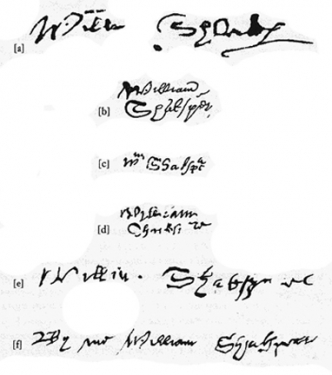1.4. Summary
Getting the wrong end of the stick and learning from it
is the basis of human development.
Martin Peake
All kinds of conclusions can be drawn from the list of non-literary references: the man from Stratford was a merchant and speculator who made money from London's then flourishing theatre business. Documents prove that Will Shakspere was part of the playing company The Chamberlain's Men, but it is not known in which capacity. He generated revenue for the troupe, invested money in the Globe – and probably took on small roles.
Will Shakspere loaned money, owed taxes, was involved in land transactions, illegally stockpiled malt and was caught up in various legal cases.
The spelling of his name varies between documents (even within a single document) and does not follow a recognisable underlying pattern. Indeed the spelling “Shakespeare” first surfaced after the initial publication of a work by William Shakespeare (Venus and Adonis, 1593).
There exists not a single recording, will or letter that names Will Shakspere in connection to a book, publishers, play or literary contemporary.
In other words: If we study the non-literary documents between 1564 and 1616, we do not find any proof whatsoever (be it in the form of personal correspondence, a reference from a contemporary, a poem or even a receipt) that links the historical figure William Shakspere to the author of the Shakespearian body of work.
The list of literary references looks very different. Shakespeare's first works are already mentioned in the 1570s. There is not a single case where the author's name is written other than as “Shakespeare” or “Shake-speare”. The hyphenated spelling (first in 1594) indicates the use of a pseudonym. During the period between 1605 and 1616, while Will Shakspere was still alive, Shakespeare is five times referred to as an author who is already deceased.
Was Shakspere a Fraud?
NO, the actor, William Shakspere (1564-1616), born in Stratford-on-Avon – never once in his life claimed to be the author of the Shakespearian works. He never claimed authorship and nobody did so on his behalf that is not until 1623. No documents, written in his handwriting have survived the passage of time. There are however six documents in existence bearing his signature.

Will Shakspere, Six signatures
We remember the quote from William Beeston (born c. 1605, died 1682), the son of Christopher Beeston, a colleague of Will Shaksper of Stratford from the days when both were members of the Lord Chamberlain’s acting company. He said of Shakspere that he was “the more to be admired, because he was not a company keeper, lived in Shoreditch, wouldn’t be debauched, and if invited to writ, he was in paine” (Aubrey’s Brief Lives, ed. 1898).
Appleton Morgan, The Shakespearean myth (1881)
The thirty-seven plays, called, collectively, “Shakespeare,” are a phenomenon, not only in English letters, but in human experience. The literature of the country to which they belong, had, up to the date of their appearance, failed to furnish, and has been utterly powerless since, to produce any type, likeness, or formative trace of them; while the literature of other nations possesses not even a corresponding type... The unremitting researches of two centuries have only been able to assign their authorship (where it rested at first) to an hiatus in the life of a wayward village lad named William Shakspere – who fled his native town penniless and before the constable, to retun, in a few years, a well-to-do esquire – with a coat of arms and money in his pocket. -- It is not, then — it is very far from being — because we know so little of the man Shakspere that we disbelieve in his authorship of the great works ascribed to him. It is because we know so much.
